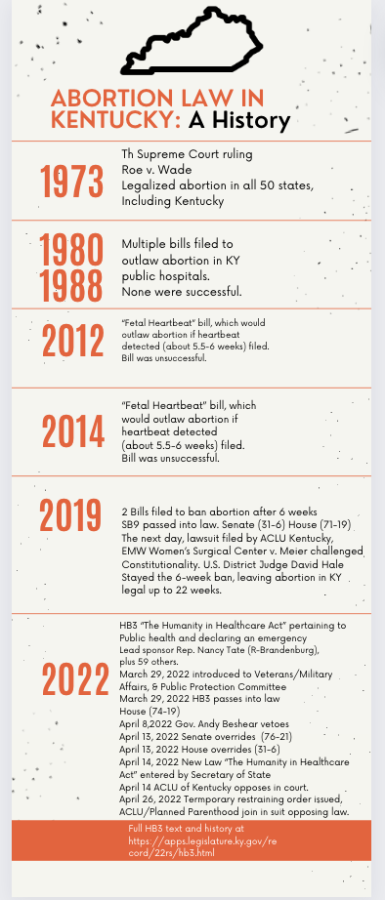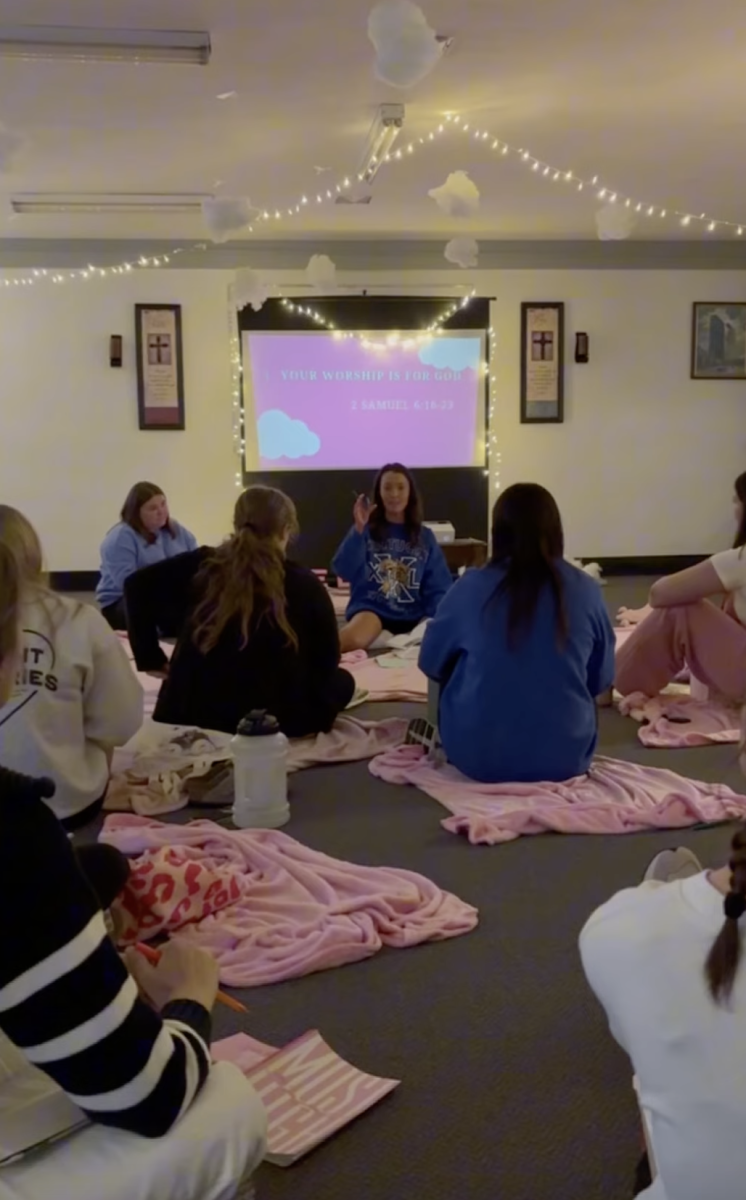“Plan B,” birth control pill may be next
Kentucky would have a near total ban on abortion, no exception for rape, incest or non-imminent life of the mother if Roe v. Wade is overturned.
April 30, 2022
HB3 sponsor shares views as new Kentucky law restricting abortion healthcare goes into effect
BY MEGHAN DANIELS
Don’t be surprised if the next Kentucky bill aimed at reproductive healthcare targets the “morning after” pill known as “Plan B” and the everyday birth control pill.
The main sponsor of pregnancy healthcare/abortion limiting House Bill 3 that became state law on April 15 in an exclusive interview Friday that she personally would want it to be fully illegal to get the “Plan B” contraceptive or the traditional birth control pill delivered by mail in Kentucky or by prescription at any of the state’s public or public university healthcare facilities.

In a Zoom interview on April 22, State Rep. Nancy Tate (R-Brandenburg) said she thinks that by allowing chemical abortion pills, Plan B or birth control pills to be ordered on the Internet and delivered, “we’re turning every dorm room into an abortion clinic.”
“We’ve turned every dorm room into an abortion clinic.”
Rep. Nancy Tate (R-Brandenburg), sponsor HB3, now law as “The Humanity in Healthcare Act”
That is Tate’s personal stance and it echoes one that has been put forth by abortion opponents in Kentucky for 20 years as groups like Right To Life Northern Kentucky have sought to define birth control pills as abortion agents.
But, it’s not, as Tate, the Kentucky Attorney General’s office and ACLU Kentucky said Friday, what is meant in the definition of “any and all” “abortion causing medicine” in the current law, which was registered in the Secretary of State’s office April 14 after the House and Senate Republican supermajority voted to override Gov. Andy Beshear’s April 8 veto.
New law from HB3, parameters, challenges
The new law, now being challenged in court by the Kentucky ACLU and Planned Parenthood, bans abortion after 15 weeks gestation, outlaws delivery of the abortion inducing medications by mail, requires pregnant people under 18 to have written consent of a parent, notification of the other parent and a government-issued ID approved by a judge 48 hours before the procedure or prescription, allows no exception in the case of rape or incest. It does allow abortion outside these parameters in the case of a medical emergency, but the bill makes clear that mental health issues are not included in the definition of medical emergency. It also bans any person on state grounds or at schools and universities/colleges from advising a patient about abortion.
On April 14, the American Civil Liberties Union of Kentucky (ACLU) immediately went to court to challenge the law, filing a motion to request a temporary restraining order. Planned Parenthood also filed a motion for a clarification of the temporary restraining order.
On April 26, the U.S. District Court granted a temporary restraining order on all the provisions of the law that House Bill 3 engendered.
ACLU Kentucky and Planned Parenthood have since joined together on the lawsuit, arguing that the new law effectively bans abortions, due to its requirement that providers record information in a database that has not yet been created and for which the bill does not provide funding. Abortion was legalized in all 50 U.S. states in 1973 in the landmark Supreme Court ruling on Roe v. Wade. So, while the Roe decision stands, it is unconstitutional for state legislatures to effectively ban abortions, the lawsuit argues.
Tate was the lead sponsor of “The Humanity in Healthcare Act,” now officially a Kentucky law. Known as HB3 as it moved through the legislature, it was co-sponsored by 59 other members.
Tate was quick to point out that she is mostly concerned about women and women’s healthcare and happiness in putting HB3 forward. And, she said, she was glad that the bill was constructed with “women around the table.”

Tate said that one of the keys for women is that they can have it all, just not at the same time. She gave herself as an example. She said she has been married since 1985 and is a mother of three grown children and grandmother of three. She pointed out, in context, that she also had a successful career as a UPS executive. Now, she said, with her childraising and business career behind her, she has been able to pursue an interest in representing the 27th district, which includes Meade County and part of Hardin County in western Kentucky.
In the interview, Tate said the control of the house, which has 75 Republicans in the 100-member body, was one reason that she decided to sponsor the bill in the recently concluded session.
Republicans also have a strong majority in the Kentucky state Senate, she said, giving the GOP power to override Gov. Andy Beshear’s veto of HB3 when it passed.
Asked if she would include the “morning after pill” known as Plan B or the standard daily oral contraceptive birth control pill in the category of “abortion-inducing drug” outlawed for mail order delivery or use on state grounds, Tate said, “I would truly endorse that,” but that it was not the intent of the original bill.
AG’s office weighs in on language of “abortion-inducing drugs” as listed in the new law
AG’s office weighs in on “abortion-inducing drugs” in new law
State Attorney General Daniel Cameron’s office, contacted for clarification of the term “abortion-inducing drug” said in an email statement by AG spokeswoman Elizabeth G. Kuhn:
“The General Assembly sets the public policy of the Commonwealth. HB3, as it is written, defines abortion-inducing drugs as:
‘Abortion-inducing drug’ means a medicine, drug or any other substance or combination of substances prescribed or dispensed with the intent of terminating the clinically diagnosable pregnancy of a woman, with knowledge that the termination will, with reasonable likelihood, cause the death of the unborn child.”
Kuhn’s statement continued: “The bill sponsor has confirmed that the definition of ‘abortion-inducing’ drugs in HB3 does not include Plan B and birth control.”
Groups have tried to limit birth control pill for decades
The history of abortion opposition in Kentucky does, however, include attempts by anti-abortion groups to define birth control pills as abortifacients. In 2002, northern Kentucky health officials narrowly rejected a proposal that equated birth control pills with abortion, declining to refuse federal Title X family planning services funding.
The Northern Kentucky Independent Health District voted 14-13 on June 19, 2002, turning back the five-year-old effort by Kentucky Right to Life to ban birth control pills as chemical abortions, a United Press International wire story picked up by a Northern Kentucky blog reported at the time.
When Republican Matt Bevin ran for U.S. Senate in 2014, he told the Northern Kentucky Right to Life group that he would not allow Medicaid to be used for birth control, filling out the group’s extensive abortion-related issues survey and gaining the group’s endorsement, according to coverage by political reporter Joe Gerth of the Courier Journal in Louisville.
ACLU challenge in court, protecting “constitutional right”
ACLU spokeswoman Angela Cooper said in a telephone interview that “It is important to us to protect Kentuckians’ constitutional right to abortion care.”
As for Tate’s hope to someday keep Plan B and birth control from being delivered or distributed without a doctor or a pharmacist, as some colleges do in vending machines, the ACLU spokeswoman said, “They are not medication abortion. Medication abortion refers to mifepristone and misoprostol. Obviously, birth control pills do not cause an abortion to occur.”
The ACLU spokeswoman added that she believes the Kentucky Board of Pharmacy would disagree that those two medications are considered abortifacients.
“Birth control pills are not abortifacients, full stop. They simply are not. Plan B is not an abortifacient, full stop,” she said. “I am certain Tate and her colleagues are interested in banning those things as well, but this bill does not do that.”
Further, Cooper said that restrictions on telehealth prescribing or on medical schools teaching surgical abortion procedures is the crux of the problem.
“It puts the government between a patient and their healthcare provider,” she said. “Under no circumstances should the government be able to force someone to remain pregnant against their will.”
UK doesn’t perform or teach abortion, will follow prescription laws
Jay Blanton, chief communications officer for the University of Kentucky, was asked about the university’s procedures regarding abortion training for medical students and university policy on the distribution and selling of abortifacents.
Blanton said in a statement on Monday, “the University does not perform abortions, except to save the life of a mother.”
Blanton also spoke to the fact that UK has an option for students to learn how to perform abortions, but it is not taught in UK facilities. At University of Louisville, Tate said, student are taught how to perform abortions, but can opt out of learning that.
“For those residents who are going through an OB/GYN rotation, there is an option of traveling to a different facility to learn these skills,” UK’s Blanton said. “Learning to perform these abortions is not required.”
On the ban on selling and distribution of abortifacients on all school grounds and state facilities, Blanton said, “Both University Health Services and the University of Kentucky Pharmacy will obey all laws concerning the dispensing of drugs.”
The two facilities in Kentucky that do provide abortion services – Planned Parenthood and EMW Women’s Surgical Center in Louisville – have resumed their services under the temporary restraining order. Planned Parenthood, EMW and ACLU Kentucky have been allowed to pursue the legal challenge together, following approval by District Judge Rebecca Grady Jennings.
“There is a hearing Monday (at 10 a.m.) for Judge Jennings to decide whether to extend the temporary restraining order, but we won’t expect a decision until closer to Thursday,” ACLU Kentucky spokeswoman Cooper said of the next steps for the lawsuit.




















